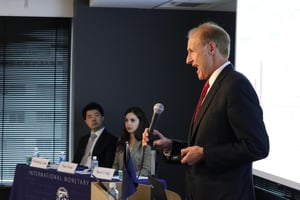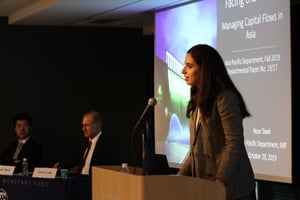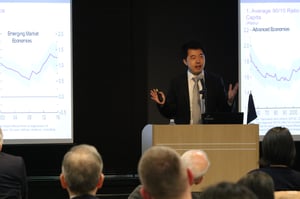News from Asia and the Pacific
Asia Should Stimulate Domestic Demand with Macroeconomic Policies, Says Snr Economist
 October 29, 2019, Tokyo, Japan – With economic growth in Asia and the rest of the world expected to slow this year, macroeconomic policies have a key role to play in supporting demand and promoting a rebound in growth, said Sean Craig, senior economist of the IMF’s Asia Pacific Department, as he introduced the latest Asia-Pacific regional economic outlook at a public seminar held by the IMF’s regional office in Tokyo.
October 29, 2019, Tokyo, Japan – With economic growth in Asia and the rest of the world expected to slow this year, macroeconomic policies have a key role to play in supporting demand and promoting a rebound in growth, said Sean Craig, senior economist of the IMF’s Asia Pacific Department, as he introduced the latest Asia-Pacific regional economic outlook at a public seminar held by the IMF’s regional office in Tokyo.
He noted that Asia is projected to grow at the slowest pace of expansion since the global financial crisis, with GDP rising by 5% in 2019 and 5.1 % in 2020, owing partly to heightened policy uncertainty and slowing growth in China and India. He recommended that priority be given to reducing this policy uncertainty by promoting the resolution of trade tensions. He then added that tightening financial sector policies could counteract the potential buildup in financial stability risks from accommodative monetary conditions.
The seminar was part of the Economic Issues Seminar series hosted by the IMF Regional Office for Asia and the Pacific (OAP), and held to share with the public key findings of the latest IMF publications – the World Economic Outlook (WEO), the Regional Economic Outlook (REO) and a departmental paper on capital flows in Asia.
 During the seminar, two other economists from the headquarters also presented their research findings. Nour Tawk of the Asia Pacific Department presented a summary of the paper on capital flows in emerging economies in Asia. She said that managing large and volatile capital flows is a central economic challenge in Asian emerging market economies, owning to the potential disruptive effects of wide swings in the exchange rate and financial conditions. Sharing key findings of the research, which also analyzed the monetary, macro-prudential and foreign exchange policy responses to volatile capital flows, she said that Asian countries adjust policy interest rates in response to inflation – consistent with inflation targeting – but also to US interest rates, exchange rates and credit growth.
During the seminar, two other economists from the headquarters also presented their research findings. Nour Tawk of the Asia Pacific Department presented a summary of the paper on capital flows in emerging economies in Asia. She said that managing large and volatile capital flows is a central economic challenge in Asian emerging market economies, owning to the potential disruptive effects of wide swings in the exchange rate and financial conditions. Sharing key findings of the research, which also analyzed the monetary, macro-prudential and foreign exchange policy responses to volatile capital flows, she said that Asian countries adjust policy interest rates in response to inflation – consistent with inflation targeting – but also to US interest rates, exchange rates and credit growth.
 Weicheng Lian of the IMF Research Department, meanwhile, shared findings of his research on the impact of automation in the advanced economies from an analytical chapter of the WEO. He said that technology shocks rather than trade shocks have a larger impact on unemployment in advanced economies, with poorer regions in the countries more vulnerable to automation. He suggested that national policies that promote more open labor markets and a robust social safety net can help counteract these adverse effects of technology shocks.
Weicheng Lian of the IMF Research Department, meanwhile, shared findings of his research on the impact of automation in the advanced economies from an analytical chapter of the WEO. He said that technology shocks rather than trade shocks have a larger impact on unemployment in advanced economies, with poorer regions in the countries more vulnerable to automation. He suggested that national policies that promote more open labor markets and a robust social safety net can help counteract these adverse effects of technology shocks.
The seminar attracted more than 80 participants from both public and private sectors, including financial officials, economists, market analysts and journalists. During the Q&A session, they shared their concerns about the trade policies that is impacting different industries and different sectors. Others commented on the impacts of supply chain affected by technology change and asked about policy coordination between nations on fiscal policy and monetary policy.


